Dear Families
As part of the Reggio Emilia philosophy of ‘the Hundred Languages’, we have been focusing on the language of clay as an important learning opportunity for our children. Clay is a material that symbolises transformation and change.
While the children interact with clay, their actions have an impact in transforming the shape of the clay. They need to be persistent in order to give shape to their ideas using this natural and sustainable material.

Supported by Mrs Harding, the children in Learning Community 1 are investigating the different stages of clay. It is the nature of clay to transform and change from soft to hard, from fragile to sturdy. The children are also exploring and experimenting with the impact of water and tools on clay.
- What happens if we use too much water?
- How do we make clay hard?
- What is made by clay?
- Where does clay come from?
These and more are the wonderings we are investigating with the children in Learning Community 1 in order to begin a path of understanding of this rich language.
Using clay is pivotal for the development of fine motor skills. As the children create with clay, they exercise small muscles in their fingers and hands. Rolling and joining pieces, cutting and using clay tools enables the children to master the artistic technique and familiarise themselves with its potential.
In Learning Community 2, the children are creating leaves, focusing on different geometric shapes, textures and volumes. Using clay provides an important opportunity to reflect on complex concepts such as tridimensional representation and balance. While the children create their shapes, we use descriptive language to notice the different textures and parts of the children’s representations. Pinching, squeezing the clay, adding details to their shape or objects is also fundamental for their hand-eye coordination development.
As educators, we are fascinated by how the children interact with this media. We are wondering:
- Are the children representing their ideas in two dimensions?
- Are they creating by adding or removing clay?
- Are they representing in three dimensions?
- How can we best document the learning process behind the language of clay?
We have been amazed by the beauty and complexity of their creations and we are looking forward to sharing with you their learning discoveries.
Caterina Pennestri
ELC Educational Leader
Important Dates
Thursday 9 June: Mid-Year Reception Transition Visits Commence
Monday 13 June: Public Holiday (ELC closed)
Tuesday 14 June: New Family Welcome Evening
Tuesday 21 June – Thursday 23 June: ELC Student Photos
Monday 27 June: ELC Hat Ceremony
The Power of Music in the ELC
At St Peter’s Girls’ Early Learners’ Centre, we understand the value music has in developing fundamental neural pathways necessary for listening and speaking, and we explore the language of music during our weekly Music sessions.
Children naturally communicate using sounds and vocalisations, and with time, their musical expressions evolve to express themselves, their ideas and knowledge. The language of music is essential for many development aspects including recognising and reproducing words, supporting memory, understanding rhyming and improving literacy skills. We provide many opportunities, through our School facilities and specialist teachers, to inspire our children from an early age, extending their understanding of music and musical instruments.
Music has an incredible number of educational benefits including mathematical concepts such as counting, gross motor skills such as balance and coordination, and social skills such as taking turns and playing together as a group. Children can easily replicate beats that occur with mathematical regularity, and this further supports their understanding of rhythm and musical patterns.
It is also a fundamental expressive language that brings our children together as a community, enjoying songs and dancing together, and cultivating a love for learning.
ELC Student Photos
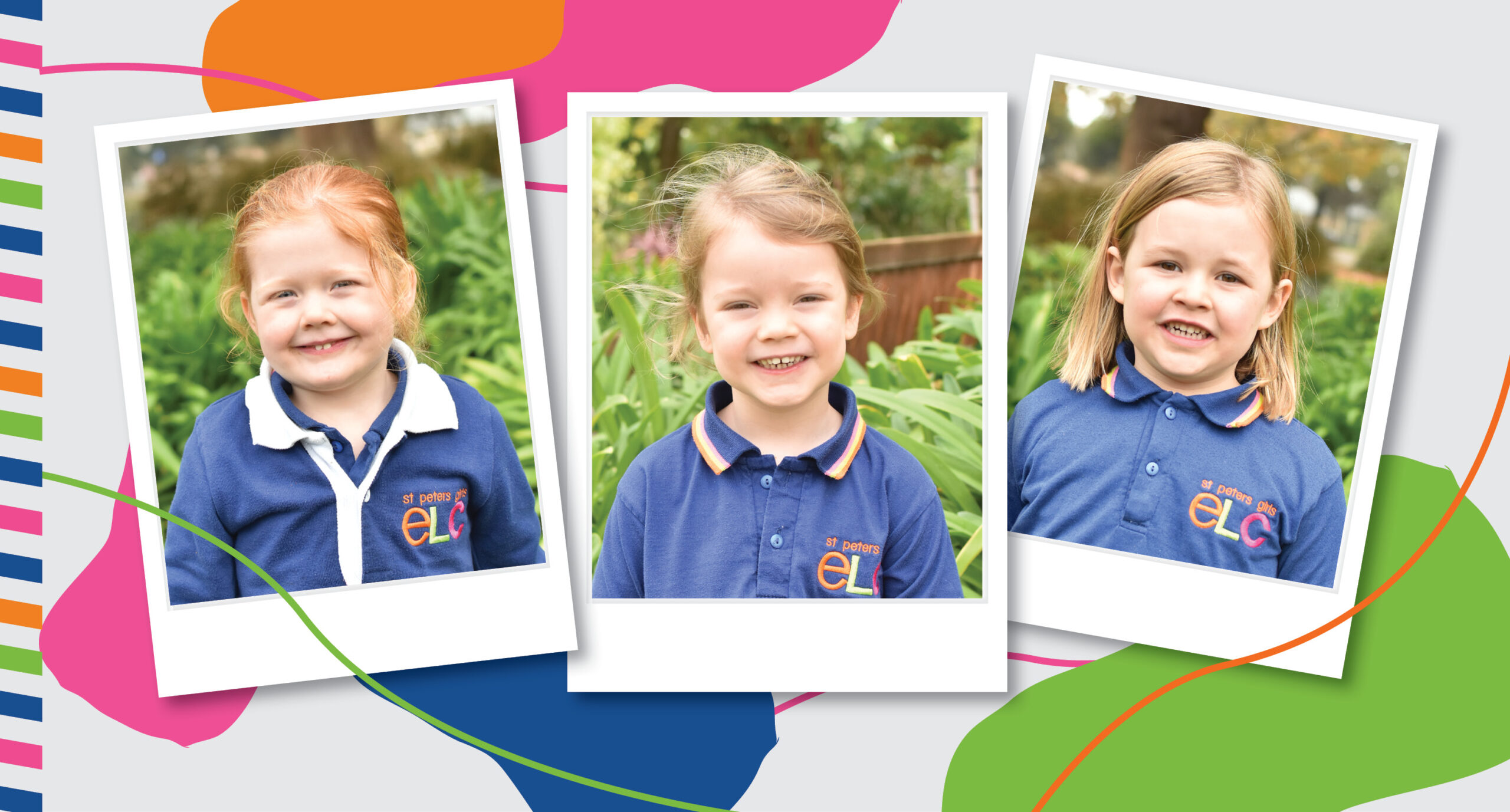
Our ELC group and individual photos will be held from Tuesday 21 to Thursday 23 June from 9am – 12 noon. Order forms have been distributed to families. The process for ordering photos is explained on the order form and letter. Please read the instructions carefully as they outline the available packages and payment methods.
Please ensure your child is wearing their ELC uniform on each of these days as they will potentially appear in multiple class shots depending on the days they attend. Please also ensure your child’s hair is styled as neatly as possible.
Each day will commence with group photos followed by individual photos. Individual photos will only occur once for each child, regardless of the number of days they attend.
Sibling photos will be taken from 10.10 – 10.30am, Wednesday 22 and Thursday 23 June in the ELC. If you wish for your children to have sibling photos taken, please fill out the additional sibling photo order form which has also been sent home to families. We ask that if your child’s sibling is in the School, that you please organise for your daughter to come to the ELC at the commencement of recess on the appropriate day.
If your child does not attend the ELC on these days and you would like them to have a photo taken, please arrange with your child’s teacher to bring them in to join their room’s group photo. We will organise for their individual photo to be taken at the same time.
Please return your order forms to your child’s teacher by Friday 17 June. If you have any further enquiries, please contact Fiona McGregor via fmcgregor@stpetersgirls.sa.edu.au.
Can You Lend a Helping Hand in the ELC?
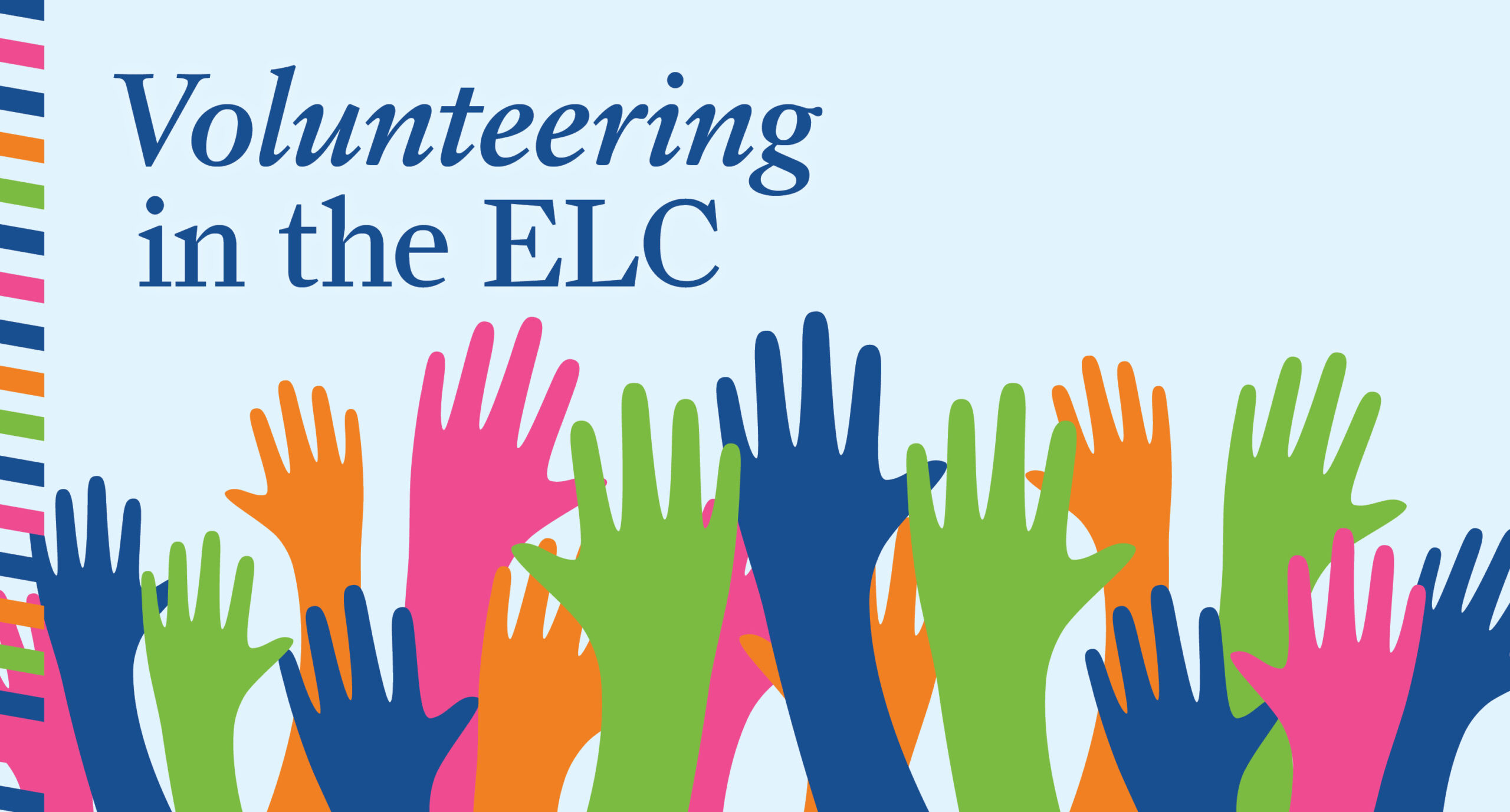
If you have an afternoon or morning spare, we would love more volunteers to join us as we explore Ferguson Conservation Park. We try to get out to Ferguson Park as much as possible to provide the children with rich learning experiences; however, this is deemed an excursion and requires higher ratios of adults to children.
Volunteering at the ELC is a fantastic opportunity to connect with the ELC community, and our treasured walks in Ferguson Park allow the children to deepen their relationship with their natural environment.
To be an ELC volunteer, we require a copy of a Working with Children Check (which can be processed free of charge through the School) and proof of COVID-19 vaccinations. If you would like to get involved, or have any other queries, please email me via hbalnaves@stpetersgirls.sa.edu.au.
We look forward to seeing you at the ELC!
Henrietta Balnaves
ELC Manager
来自黄老师的信息
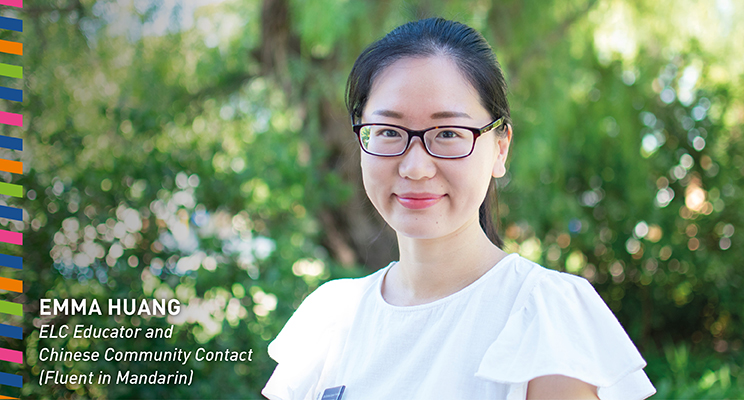
亲爱的家长们,
作为Reggio Emilia百种语言教学理念的一部分,黏土也是我们非常注重的一种特殊的语言。沾土的使用为孩子们提供了重要的学习机会,因为黏土这种材料可以塑造各种不同的形状,象征着变形与变化。
在孩子们与黏土互动时,她们的动作对黏土形状的变化起着决定性的影响。想要用这种天然的、可持续的材料将脑子中的想法变成一个具体的形状,孩子们必须保持足够的耐心和认真劲儿。
在Harding女士的支持下,学习共同体1的孩子们正在对黏土的不同阶段进行研究。黏土具有一种天然的特性,它能够从软变硬,从脆弱变得牢固。孩子们也在对水和工具如何影响黏土的变化进行各种探索与实验。
- 如果我们使用太多水,会发生什么?
- 什么东西是用黏土做成的?
- 黏土来自哪里?
类似这样的问题很多很多,我们也在和孩子们一起进行调查研究。黏土是一种具有丰富表达力的语言,需要我们去进一步了解和掌握。
使用黏土能够很好地开发和锻炼精细动作技能。在孩子们使用黏土进行创作时,她们锻炼了手指和手部的小肌肉。在揉搓、拼接、切割和使用黏土工具的过程中,孩子们能够学习并掌握各种艺术手法,并对这些艺术手法的潜力更加熟稔于心。
在学习共同体2,孩子们正在用黏土制作树叶,并重点关注树叶的形状、纹理和大小。通过使用黏土,孩子们需要考虑很多复杂的概念,比如物体的三维呈现、尺寸比例的协调等等,这是一种非常重要的学习和锻炼机会。在孩子们创作不同的形状时,我们使用描述性的语言对孩子们的创作进行评价,包括纹理和其它细节部分。孩子们在揉捏和挤压黏土或者给黏土的外形添加一些细节的过程中,眼睛和手的协调与配合能力也能得到很好的锻炼。
作为教育者,我们被孩子们与黏土的各种创造性的互动深深吸引。我们想知道:
- 孩子们是在二维视角呈现她们的想法吗?
- 在对黏土进行修补的过程中,她们是在创作吗?
- 她们是在三维视角呈现她们的想法吗?
- 黏土这种语言的背后是怎样的学习过程,我们该如何对这一学习过程进行纪录?
孩子们的创作非常漂亮,也非常精致。我们期待与你们一起分享她们的学习成果与收获。
Emma Huang works in Learning Community 2 on Tuesdays, Thursdays and Fridays from 9am – 5pm.
News from Learning Community 1
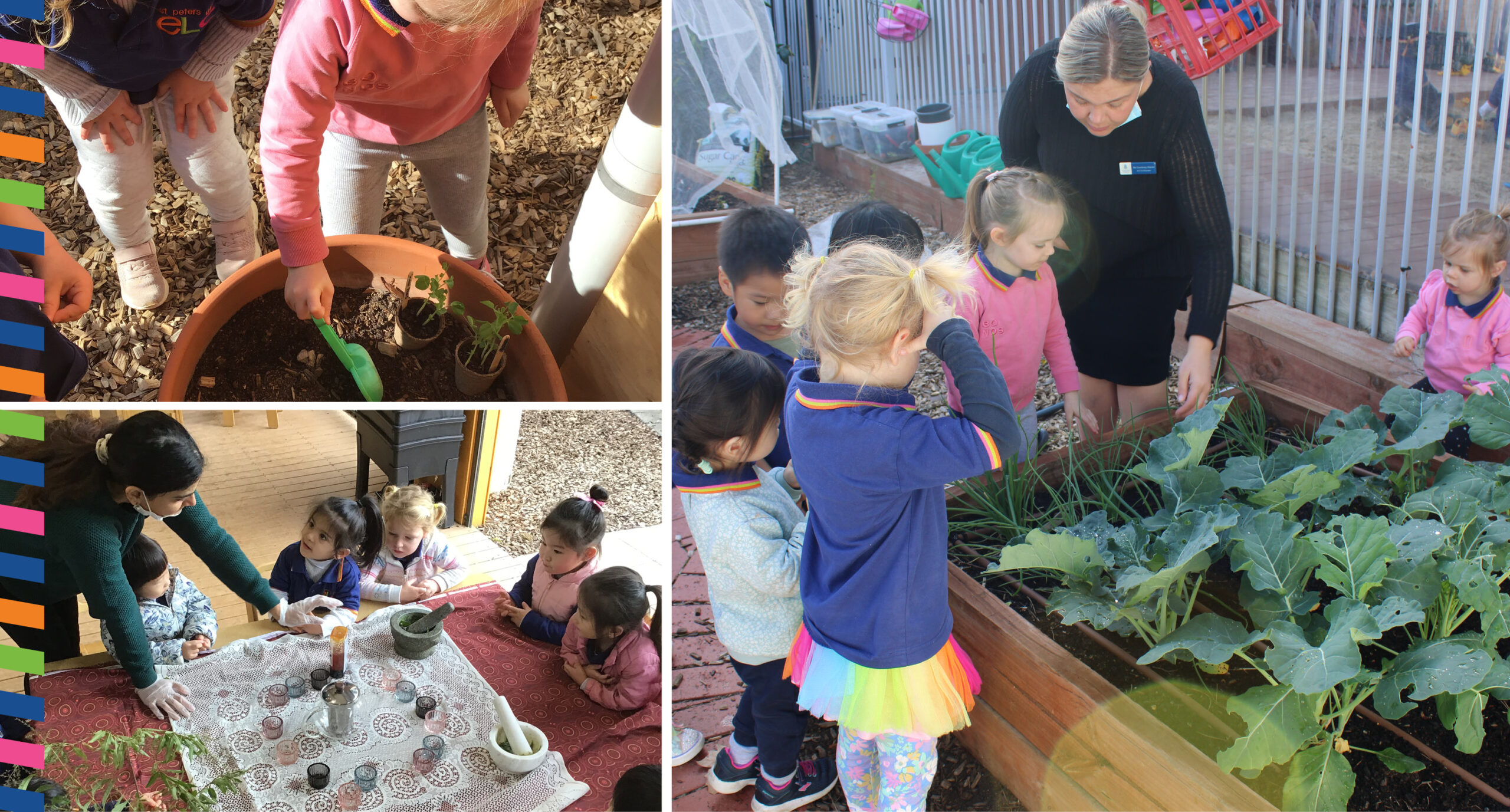
This term, our unit of inquiry is focused on the key concept of change led by our Central Idea: Welcoming transformation can support the development of knowledge.
The children’s interests and discussions around change have taken a strong focus on transformation in the natural world. They have been noticing changing weather patterns, seasonal transformation and the growth of plants, both in our ELC Community Garden and in Ferguson Park.
The children have been provided with opportunities to explore and research in the natural environment, using their senses to interact and engage with nature. Within the classroom, they have been invited to represent, document and share their observations and understandings using a range of creative languages.
Our explorations in Ferguson Park have allowed us to use the language of photography to document the changing landscape and reflect on the transformations that are occurring after we return to the ELC. Through our Literacy program, we have shared a range of texts to support children’s developing understandings of seasonal changes and weather patterns. The children have used loose parts, drawing and watercolour paints to represent autumn and share their knowledge and understandings.
We continue to explore lifecycles of fruits and vegetables through planting and caring for the seedlings in our ELC Community Garden. Small groups of children visit the ELC Community Garden on a regular basis where they are tending to our plants, documenting growth through measurement, photography and drawing, and harvesting produce when it is ready. The produce is then being used to cook and create within the classroom, further enhancing children’s knowledge of sustainable and healthy eating.
Jessica Guimaraes and Jess Catt
Learning Community 1
News from Learning Community 2
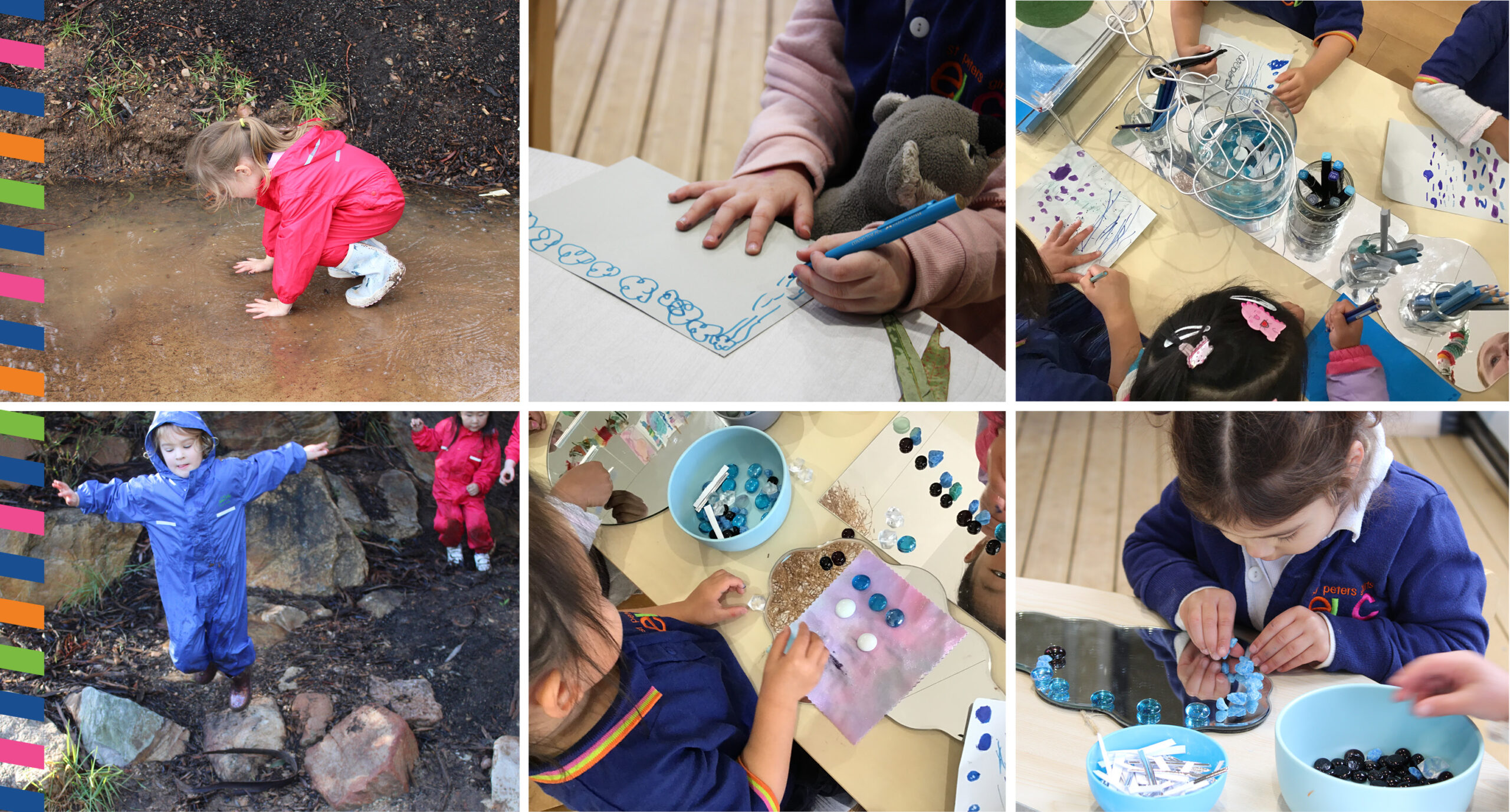
This term, our Central Idea is: Welcoming transformation can support wellbeing. But how does this translate into our everyday learning opportunities and practice in Learning Community 2?
The educators have been developing and implementing a range of practical experiences in three key areas for the children to explore and understand the concept of transformation and change:
- Transformation in the natural world – exploring and documenting the weather, the ELC Community Garden and Ferguson Park
- Transformation in ourselves – exploring and tracking how our feelings and emotions can change and shift and how we physically grow and change over time
- Transformation in our skills and abilities – exploring the concepts of persistence, resilience, having a go and trying again through sports-based activities, puzzles and games
This week, we have been inspired by the change in the weather. As a cold snap hit most of the country, we took this opportunity to engage the children in a range of experiences exploring the rain. Some children need physical full body engagement, so we went out in our rain suits and connected with the weather through our senses. Some children engaged with a range of creative languages to draw, paint, and make the rain and rain drops with recycled materials. These creative experiences were linked with mathematics and had a strong focus on sequencing and patterns. Some children worked with their educators to create books, writing and drawing what they can do on rainy days and how the rain makes them feel.
This diversity of our curriculum occurs on a daily basis as all our children’s needs and learning styles are different. We also aim to embed a range of academic curriculum areas in all the experiences we offer the children. As educators, we believe this enriches the learning for the children and also allows for deeper engagement and connection to their lived experiences.
We have been working hard to capture and document your children’s involvement in these experiences and are excited to share these with you through your child’s portfolio which will be available for you at the end of this term.
Nell Tierney, Kathy McCabe and Laura Reiters
Learning Community 2
Find Out What Happens Throughout the Day at ELC
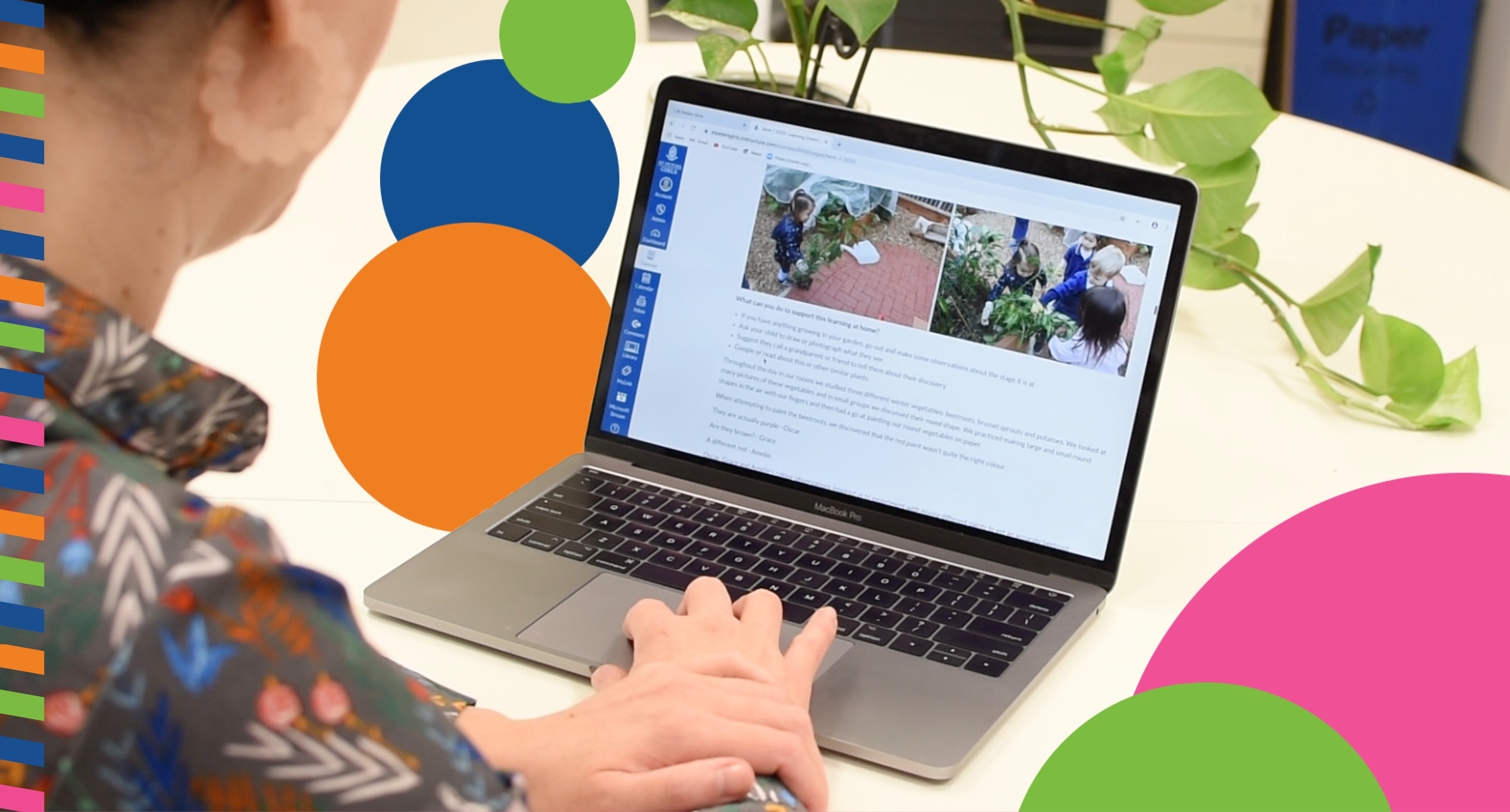
The ELC Learning Community Home Page is a dynamic online sharing space that invites you to participate in the communities’ learning as it happens. We use this tool to communicate important information with families and provide a window into the children’s life at the ELC, as educators share documentation of teaching, specialist lessons and spontaneous moments.
Accessing myLink for the first time:
Each parent has an individual username to access our myLink parent portal.
Your username is {ID+}@stpetersgirls.sa.edu.au
Please note that the username is your ID number followed by @stpetersgirls.sa.edu.au
Your ID number has been provided to you in an email from the School
If you have not accessed myLink before or have forgotten your password, please follow these steps:
- Visit https://mylink.stpetersgirls.sa.edu.au
- Sign in with your parent username
- Click on ‘Forgot my password’
- Make sure the ‘email’ address is your parent username, type in the code, then click the blue ‘Next’ button
- Enter your mobile number registered with the School, with the area code (Australia is +61), dropping the 0 at the beginning (e.g. +61 400000000). Then select ‘Text’
- Enter the security code sent to your mobile number
- Enter the password you would like to use and click ‘Finish’
- Return to the login screen at https://mylink.stpetersgirls.sa.edu.au to access myLink
Accessing the Learning Community Home Page through myLink:
- Access myLink as per the above instructions
- Click on the ‘MYLINK HOME’ tab
- Click on your child’s name tab
- Under ‘Class Contacts’, click on the ELC room name (you may need to enter your user name and password again)
If you have any issues accessing or navigating myLink, please contact our IT Hub via helpdesk@stpetersgirls.sa.edu.au or 8334 2227.
ELC’s Online Etiquette Policy: please note that the ELC Learning Community Home Page and ELC News contain images and videos of other children. We therefore ask that you do not copy or share images or videos, especially on social media, if they contain other children.
Absences in the ELC
Student Absences Please notify the School via one of the following methods for late arrivals/early departures and absences, ensuring a reason for the absence is included.
Text: 0428 601 957 (save to phone contacts as SPGS)
Email: attendance@stpetersgirls.sa.edu.au
Phone: 8334 2200 or phone the relevant room as per the contact list below.
Please include the relevant room teacher when sending via email.
ELC Room Contacts:
Bell Yett – 8155 5777
Ferguson – 8155 5776
Hallett – 8155 5775
Stonyfell – 8155 5778
ELC Immunisation Policy
Under the Government’s No Jab No Play policy, families must meet immunisation requirements to attend the ELC and receive the Child Care Subsidy. Families are required to provide all approved immunisation records to the ELC. Further information is available by clicking here.
Children who are suffering from illnesses such as those listed below must be excluded from ELC in line with our Exclusion Policy:
- Influenza
- Chicken Pox
- Conjunctivitis
- Diarrhoea
- Hand, Foot and Mouth Disease
- High Temperature
- Infectious Hepatitis
- Measles
- Meningitis
- Mumps
- Rubella (German Measles)
- Scabies
- Scarlet Fever
- School Sores (Impetigo)
- Upper Respiratory Tract Infection
- Vomiting
- Whooping Cough
You’re Invited to Our Starry Night Gala Ball

We are counting down to our Starry Night Gala Ball on Saturday 18 June to celebrate and support our fundraising efforts for a new Gym.
Don’t miss out on this amazing evening with our Saints Girls’ community.
7pm, Saturday 18 June
Adelaide Convention Centre
Tickets: $200 per person
Includes three-course meal, beverages and live entertainment
Can You Lend a Helping Hand in the ELC?

If you have an afternoon or morning spare, we would love more volunteers to join us as we explore Ferguson Conservation Park. We try to get out to Ferguson Park as much as possible to provide the children with rich learning experiences; however, this is deemed an excursion and requires higher ratios of adults to children.
Volunteering at the ELC is a fantastic opportunity to connect with the ELC community, and our treasured walks in Ferguson Park allow the children to deepen their relationship with their natural environment.
To be an ELC volunteer, we require a copy of a Working with Children Check (which can be processed free of charge through the School) and proof of COVID-19 vaccinations. If you would like to get involved, or have any other queries, please email me via hbalnaves@stpetersgirls.sa.edu.au.
We look forward to seeing you at the ELC!
Henrietta Balnaves
ELC Manager
来自黄老师的信息

亲爱的家长们,
作为Reggio Emilia百种语言教学理念的一部分,黏土也是我们非常注重的一种特殊的语言。沾土的使用为孩子们提供了重要的学习机会,因为黏土这种材料可以塑造各种不同的形状,象征着变形与变化。
在孩子们与黏土互动时,她们的动作对黏土形状的变化起着决定性的影响。想要用这种天然的、可持续的材料将脑子中的想法变成一个具体的形状,孩子们必须保持足够的耐心和认真劲儿。
在Harding女士的支持下,学习共同体1的孩子们正在对黏土的不同阶段进行研究。黏土具有一种天然的特性,它能够从软变硬,从脆弱变得牢固。孩子们也在对水和工具如何影响黏土的变化进行各种探索与实验。
- 如果我们使用太多水,会发生什么?
- 什么东西是用黏土做成的?
- 黏土来自哪里?
类似这样的问题很多很多,我们也在和孩子们一起进行调查研究。黏土是一种具有丰富表达力的语言,需要我们去进一步了解和掌握。
使用黏土能够很好地开发和锻炼精细动作技能。在孩子们使用黏土进行创作时,她们锻炼了手指和手部的小肌肉。在揉搓、拼接、切割和使用黏土工具的过程中,孩子们能够学习并掌握各种艺术手法,并对这些艺术手法的潜力更加熟稔于心。
在学习共同体2,孩子们正在用黏土制作树叶,并重点关注树叶的形状、纹理和大小。通过使用黏土,孩子们需要考虑很多复杂的概念,比如物体的三维呈现、尺寸比例的协调等等,这是一种非常重要的学习和锻炼机会。在孩子们创作不同的形状时,我们使用描述性的语言对孩子们的创作进行评价,包括纹理和其它细节部分。孩子们在揉捏和挤压黏土或者给黏土的外形添加一些细节的过程中,眼睛和手的协调与配合能力也能得到很好的锻炼。
作为教育者,我们被孩子们与黏土的各种创造性的互动深深吸引。我们想知道:
- 孩子们是在二维视角呈现她们的想法吗?
- 在对黏土进行修补的过程中,她们是在创作吗?
- 她们是在三维视角呈现她们的想法吗?
- 黏土这种语言的背后是怎样的学习过程,我们该如何对这一学习过程进行纪录?
孩子们的创作非常漂亮,也非常精致。我们期待与你们一起分享她们的学习成果与收获。
Emma Huang works in Learning Community 2 on Tuesdays, Thursdays and Fridays from 9am – 5pm.
News from Learning Community 1

This term, our unit of inquiry is focused on the key concept of change led by our Central Idea: Welcoming transformation can support the development of knowledge.
The children’s interests and discussions around change have taken a strong focus on transformation in the natural world. They have been noticing changing weather patterns, seasonal transformation and the growth of plants, both in our ELC Community Garden and in Ferguson Park.
The children have been provided with opportunities to explore and research in the natural environment, using their senses to interact and engage with nature. Within the classroom, they have been invited to represent, document and share their observations and understandings using a range of creative languages.
Our explorations in Ferguson Park have allowed us to use the language of photography to document the changing landscape and reflect on the transformations that are occurring after we return to the ELC. Through our Literacy program, we have shared a range of texts to support children’s developing understandings of seasonal changes and weather patterns. The children have used loose parts, drawing and watercolour paints to represent autumn and share their knowledge and understandings.
We continue to explore lifecycles of fruits and vegetables through planting and caring for the seedlings in our ELC Community Garden. Small groups of children visit the ELC Community Garden on a regular basis where they are tending to our plants, documenting growth through measurement, photography and drawing, and harvesting produce when it is ready. The produce is then being used to cook and create within the classroom, further enhancing children’s knowledge of sustainable and healthy eating.
Jessica Guimaraes and Jess Catt
Learning Community 1
News from Learning Community 2

This term, our Central Idea is: Welcoming transformation can support wellbeing. But how does this translate into our everyday learning opportunities and practice in Learning Community 2?
The educators have been developing and implementing a range of practical experiences in three key areas for the children to explore and understand the concept of transformation and change:
- Transformation in the natural world – exploring and documenting the weather, the ELC Community Garden and Ferguson Park
- Transformation in ourselves – exploring and tracking how our feelings and emotions can change and shift and how we physically grow and change over time
- Transformation in our skills and abilities – exploring the concepts of persistence, resilience, having a go and trying again through sports-based activities, puzzles and games
This week, we have been inspired by the change in the weather. As a cold snap hit most of the country, we took this opportunity to engage the children in a range of experiences exploring the rain. Some children need physical full body engagement, so we went out in our rain suits and connected with the weather through our senses. Some children engaged with a range of creative languages to draw, paint, and make the rain and rain drops with recycled materials. These creative experiences were linked with mathematics and had a strong focus on sequencing and patterns. Some children worked with their educators to create books, writing and drawing what they can do on rainy days and how the rain makes them feel.
This diversity of our curriculum occurs on a daily basis as all our children’s needs and learning styles are different. We also aim to embed a range of academic curriculum areas in all the experiences we offer the children. As educators, we believe this enriches the learning for the children and also allows for deeper engagement and connection to their lived experiences.
We have been working hard to capture and document your children’s involvement in these experiences and are excited to share these with you through your child’s portfolio which will be available for you at the end of this term.
Nell Tierney, Kathy McCabe and Laura Reiters
Learning Community 2
Find Out What Happens Throughout the Day at ELC

The ELC Learning Community Home Page is a dynamic online sharing space that invites you to participate in the communities’ learning as it happens. We use this tool to communicate important information with families and provide a window into the children’s life at the ELC, as educators share documentation of teaching, specialist lessons and spontaneous moments.
Accessing myLink for the first time:
Each parent has an individual username to access our myLink parent portal.
Your username is {ID+}@stpetersgirls.sa.edu.au
Please note that the username is your ID number followed by @stpetersgirls.sa.edu.au
Your ID number has been provided to you in an email from the School
If you have not accessed myLink before or have forgotten your password, please follow these steps:
- Visit https://mylink.stpetersgirls.sa.edu.au
- Sign in with your parent username
- Click on ‘Forgot my password’
- Make sure the ‘email’ address is your parent username, type in the code, then click the blue ‘Next’ button
- Enter your mobile number registered with the School, with the area code (Australia is +61), dropping the 0 at the beginning (e.g. +61 400000000). Then select ‘Text’
- Enter the security code sent to your mobile number
- Enter the password you would like to use and click ‘Finish’
- Return to the login screen at https://mylink.stpetersgirls.sa.edu.au to access myLink
Accessing the Learning Community Home Page through myLink:
- Access myLink as per the above instructions
- Click on the ‘MYLINK HOME’ tab
- Click on your child’s name tab
- Under ‘Class Contacts’, click on the ELC room name (you may need to enter your user name and password again)
If you have any issues accessing or navigating myLink, please contact our IT Hub via helpdesk@stpetersgirls.sa.edu.au or 8334 2227.
ELC’s Online Etiquette Policy: please note that the ELC Learning Community Home Page and ELC News contain images and videos of other children. We therefore ask that you do not copy or share images or videos, especially on social media, if they contain other children.
Absences in the ELC
Student Absences Please notify the School via one of the following methods for late arrivals/early departures and absences, ensuring a reason for the absence is included.
Text: 0428 601 957 (save to phone contacts as SPGS)
Email: attendance@stpetersgirls.sa.edu.au
Phone: 8334 2200 or phone the relevant room as per the contact list below.
Please include the relevant room teacher when sending via email.
ELC Room Contacts:
Bell Yett – 8155 5777
Ferguson – 8155 5776
Hallett – 8155 5775
Stonyfell – 8155 5778
ELC Immunisation Policy
Under the Government’s No Jab No Play policy, families must meet immunisation requirements to attend the ELC and receive the Child Care Subsidy. Families are required to provide all approved immunisation records to the ELC. Further information is available by clicking here.
Children who are suffering from illnesses such as those listed below must be excluded from ELC in line with our Exclusion Policy:
- Influenza
- Chicken Pox
- Conjunctivitis
- Diarrhoea
- Hand, Foot and Mouth Disease
- High Temperature
- Infectious Hepatitis
- Measles
- Meningitis
- Mumps
- Rubella (German Measles)
- Scabies
- Scarlet Fever
- School Sores (Impetigo)
- Upper Respiratory Tract Infection
- Vomiting
- Whooping Cough
Sustainability in the ELC
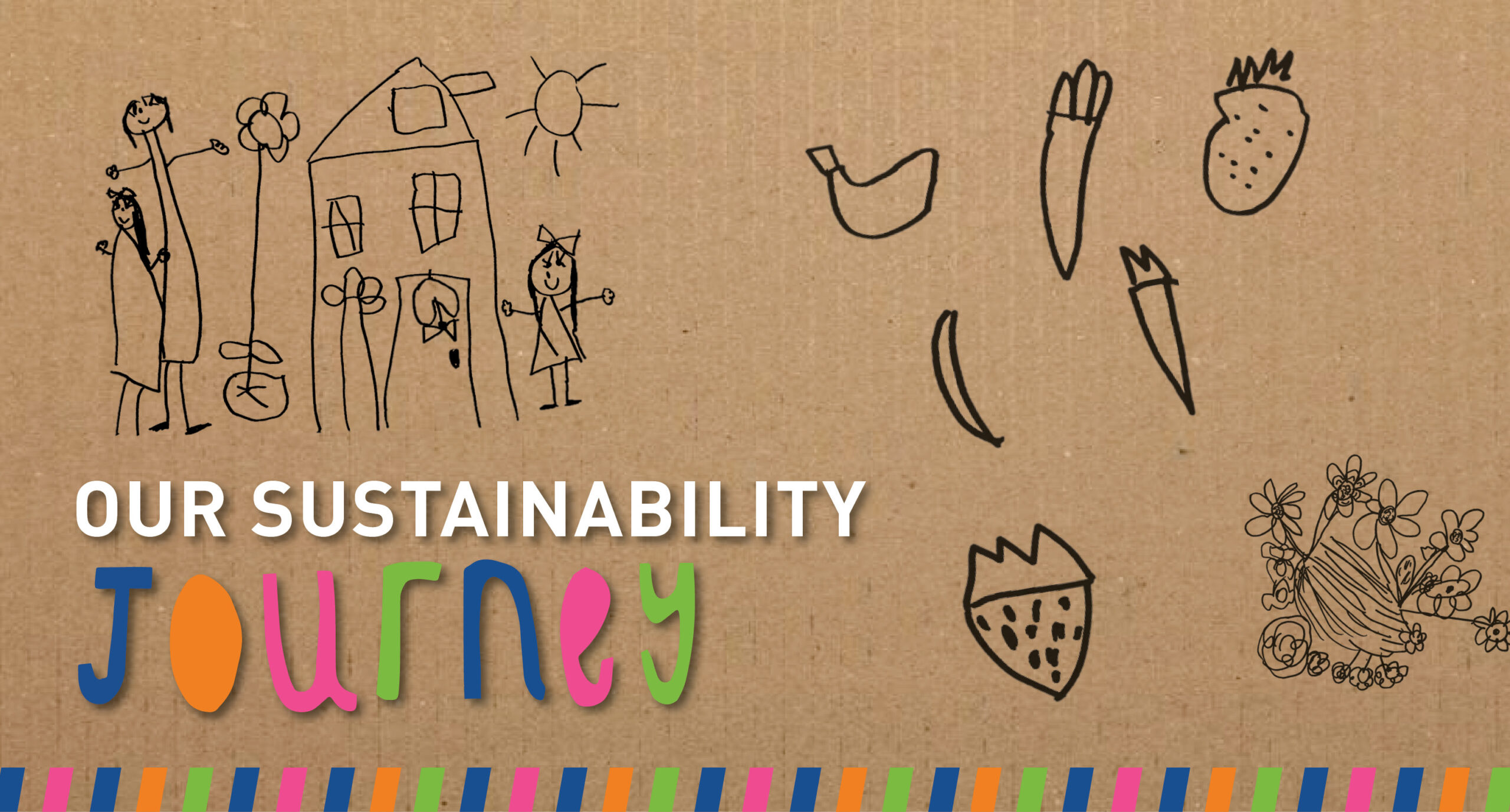
Educating for sustainability begins by supporting children’s understanding of the way the world works, such as the way things grow. Our ELC ‘Garden-to-Plate’ program is a great example of this. Connecting children as young as 2 years old to the concept of growing vegetables takes us one step further towards our goal of creating healthy lifelong relationships between children and the foods they eat.
The children in Learning Community 1 have been welcoming change and transformation by growing seedlings and documenting the changes.
‘They are growing.’ – Lydia
‘They’re not carrots yet…’ – Kayla
‘They have popped out!’ – Alina
‘Look, look, they grow big, big, big.’ – Khloe
‘It’s green!’ – Qing
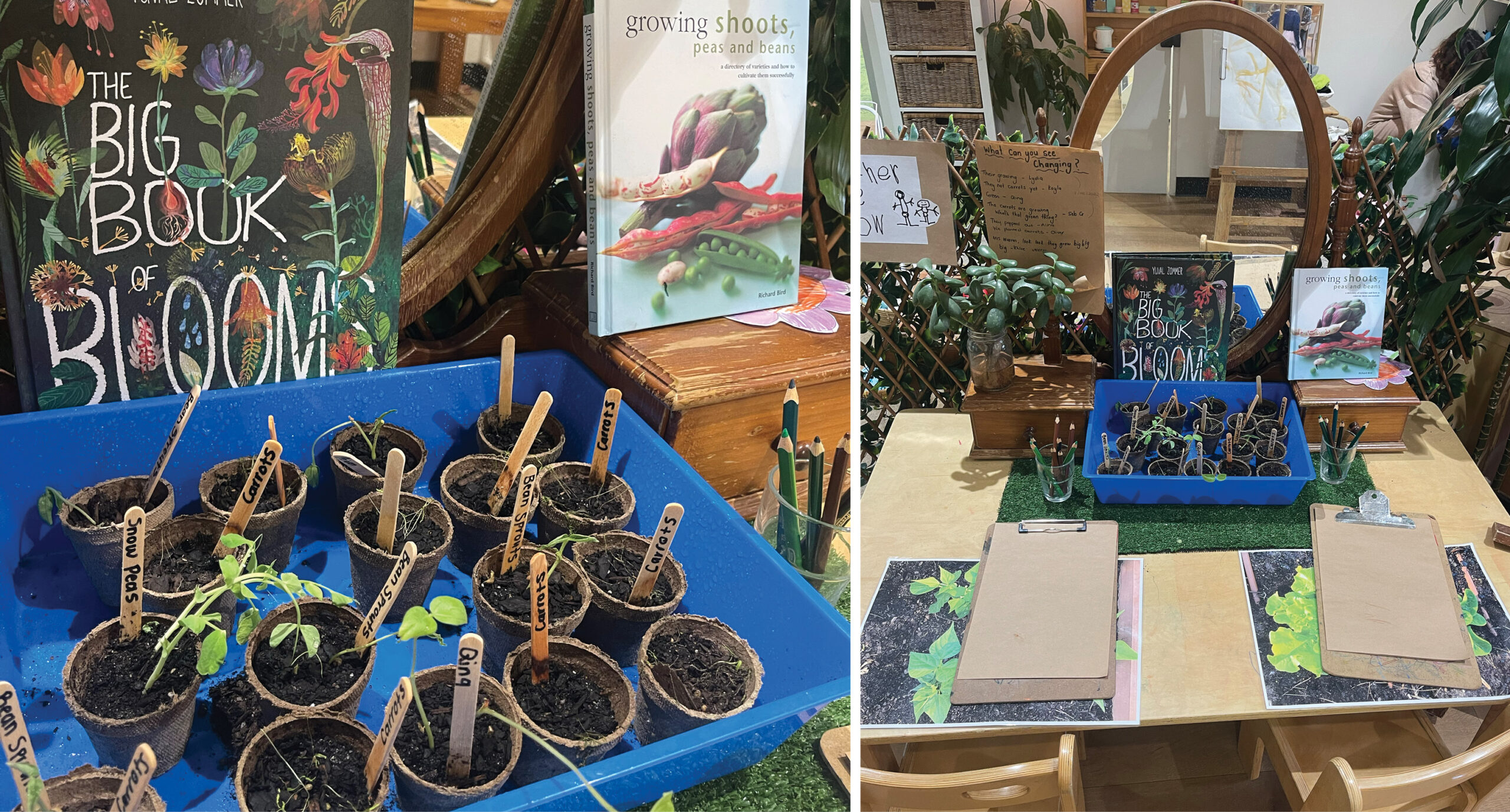
In order for children to comprehend the whole picture from garden to plate, it is important we slow down so that each step can be understood and appreciated.
Educators are then continuing to offer children the opportunity to explore and cook the vegetables that are growing, connecting the two sections of our ‘Garden-to-Plate’ cooking program.
Learning Community 1
You’re Invited to Our Starry Night Gala Ball

We are counting down to our Starry Night Gala Ball on Saturday 18 June to celebrate and support our fundraising efforts for a new Gym.
Don’t miss out on this amazing evening with our Saints Girls’ community.
7pm, Saturday 18 June
Adelaide Convention Centre
Tickets: $200 per person
Includes three-course meal, beverages and live entertainment
Can You Lend a Helping Hand in the ELC?

If you have an afternoon or morning spare, we would love more volunteers to join us as we explore Ferguson Conservation Park. We try to get out to Ferguson Park as much as possible to provide the children with rich learning experiences; however, this is deemed an excursion and requires higher ratios of adults to children.
Volunteering at the ELC is a fantastic opportunity to connect with the ELC community, and our treasured walks in Ferguson Park allow the children to deepen their relationship with their natural environment.
To be an ELC volunteer, we require a copy of a Working with Children Check (which can be processed free of charge through the School) and proof of COVID-19 vaccinations. If you would like to get involved, or have any other queries, please email me via hbalnaves@stpetersgirls.sa.edu.au.
We look forward to seeing you at the ELC!
Henrietta Balnaves
ELC Manager
来自黄老师的信息

亲爱的家长们,
作为Reggio Emilia百种语言教学理念的一部分,黏土也是我们非常注重的一种特殊的语言。沾土的使用为孩子们提供了重要的学习机会,因为黏土这种材料可以塑造各种不同的形状,象征着变形与变化。
在孩子们与黏土互动时,她们的动作对黏土形状的变化起着决定性的影响。想要用这种天然的、可持续的材料将脑子中的想法变成一个具体的形状,孩子们必须保持足够的耐心和认真劲儿。
在Harding女士的支持下,学习共同体1的孩子们正在对黏土的不同阶段进行研究。黏土具有一种天然的特性,它能够从软变硬,从脆弱变得牢固。孩子们也在对水和工具如何影响黏土的变化进行各种探索与实验。
- 如果我们使用太多水,会发生什么?
- 什么东西是用黏土做成的?
- 黏土来自哪里?
类似这样的问题很多很多,我们也在和孩子们一起进行调查研究。黏土是一种具有丰富表达力的语言,需要我们去进一步了解和掌握。
使用黏土能够很好地开发和锻炼精细动作技能。在孩子们使用黏土进行创作时,她们锻炼了手指和手部的小肌肉。在揉搓、拼接、切割和使用黏土工具的过程中,孩子们能够学习并掌握各种艺术手法,并对这些艺术手法的潜力更加熟稔于心。
在学习共同体2,孩子们正在用黏土制作树叶,并重点关注树叶的形状、纹理和大小。通过使用黏土,孩子们需要考虑很多复杂的概念,比如物体的三维呈现、尺寸比例的协调等等,这是一种非常重要的学习和锻炼机会。在孩子们创作不同的形状时,我们使用描述性的语言对孩子们的创作进行评价,包括纹理和其它细节部分。孩子们在揉捏和挤压黏土或者给黏土的外形添加一些细节的过程中,眼睛和手的协调与配合能力也能得到很好的锻炼。
作为教育者,我们被孩子们与黏土的各种创造性的互动深深吸引。我们想知道:
- 孩子们是在二维视角呈现她们的想法吗?
- 在对黏土进行修补的过程中,她们是在创作吗?
- 她们是在三维视角呈现她们的想法吗?
- 黏土这种语言的背后是怎样的学习过程,我们该如何对这一学习过程进行纪录?
孩子们的创作非常漂亮,也非常精致。我们期待与你们一起分享她们的学习成果与收获。
Emma Huang works in Learning Community 2 on Tuesdays, Thursdays and Fridays from 9am – 5pm.
News from Learning Community 1

This term, our unit of inquiry is focused on the key concept of change led by our Central Idea: Welcoming transformation can support the development of knowledge.
The children’s interests and discussions around change have taken a strong focus on transformation in the natural world. They have been noticing changing weather patterns, seasonal transformation and the growth of plants, both in our ELC Community Garden and in Ferguson Park.
The children have been provided with opportunities to explore and research in the natural environment, using their senses to interact and engage with nature. Within the classroom, they have been invited to represent, document and share their observations and understandings using a range of creative languages.
Our explorations in Ferguson Park have allowed us to use the language of photography to document the changing landscape and reflect on the transformations that are occurring after we return to the ELC. Through our Literacy program, we have shared a range of texts to support children’s developing understandings of seasonal changes and weather patterns. The children have used loose parts, drawing and watercolour paints to represent autumn and share their knowledge and understandings.
We continue to explore lifecycles of fruits and vegetables through planting and caring for the seedlings in our ELC Community Garden. Small groups of children visit the ELC Community Garden on a regular basis where they are tending to our plants, documenting growth through measurement, photography and drawing, and harvesting produce when it is ready. The produce is then being used to cook and create within the classroom, further enhancing children’s knowledge of sustainable and healthy eating.
Jessica Guimaraes and Jess Catt
Learning Community 1
News from Learning Community 2

This term, our Central Idea is: Welcoming transformation can support wellbeing. But how does this translate into our everyday learning opportunities and practice in Learning Community 2?
The educators have been developing and implementing a range of practical experiences in three key areas for the children to explore and understand the concept of transformation and change:
- Transformation in the natural world – exploring and documenting the weather, the ELC Community Garden and Ferguson Park
- Transformation in ourselves – exploring and tracking how our feelings and emotions can change and shift and how we physically grow and change over time
- Transformation in our skills and abilities – exploring the concepts of persistence, resilience, having a go and trying again through sports-based activities, puzzles and games
This week, we have been inspired by the change in the weather. As a cold snap hit most of the country, we took this opportunity to engage the children in a range of experiences exploring the rain. Some children need physical full body engagement, so we went out in our rain suits and connected with the weather through our senses. Some children engaged with a range of creative languages to draw, paint, and make the rain and rain drops with recycled materials. These creative experiences were linked with mathematics and had a strong focus on sequencing and patterns. Some children worked with their educators to create books, writing and drawing what they can do on rainy days and how the rain makes them feel.
This diversity of our curriculum occurs on a daily basis as all our children’s needs and learning styles are different. We also aim to embed a range of academic curriculum areas in all the experiences we offer the children. As educators, we believe this enriches the learning for the children and also allows for deeper engagement and connection to their lived experiences.
We have been working hard to capture and document your children’s involvement in these experiences and are excited to share these with you through your child’s portfolio which will be available for you at the end of this term.
Nell Tierney, Kathy McCabe and Laura Reiters
Learning Community 2
Find Out What Happens Throughout the Day at ELC

The ELC Learning Community Home Page is a dynamic online sharing space that invites you to participate in the communities’ learning as it happens. We use this tool to communicate important information with families and provide a window into the children’s life at the ELC, as educators share documentation of teaching, specialist lessons and spontaneous moments.
Accessing myLink for the first time:
Each parent has an individual username to access our myLink parent portal.
Your username is {ID+}@stpetersgirls.sa.edu.au
Please note that the username is your ID number followed by @stpetersgirls.sa.edu.au
Your ID number has been provided to you in an email from the School
If you have not accessed myLink before or have forgotten your password, please follow these steps:
- Visit https://mylink.stpetersgirls.sa.edu.au
- Sign in with your parent username
- Click on ‘Forgot my password’
- Make sure the ‘email’ address is your parent username, type in the code, then click the blue ‘Next’ button
- Enter your mobile number registered with the School, with the area code (Australia is +61), dropping the 0 at the beginning (e.g. +61 400000000). Then select ‘Text’
- Enter the security code sent to your mobile number
- Enter the password you would like to use and click ‘Finish’
- Return to the login screen at https://mylink.stpetersgirls.sa.edu.au to access myLink
Accessing the Learning Community Home Page through myLink:
- Access myLink as per the above instructions
- Click on the ‘MYLINK HOME’ tab
- Click on your child’s name tab
- Under ‘Class Contacts’, click on the ELC room name (you may need to enter your user name and password again)
If you have any issues accessing or navigating myLink, please contact our IT Hub via helpdesk@stpetersgirls.sa.edu.au or 8334 2227.
ELC’s Online Etiquette Policy: please note that the ELC Learning Community Home Page and ELC News contain images and videos of other children. We therefore ask that you do not copy or share images or videos, especially on social media, if they contain other children.
Absences in the ELC
Student Absences Please notify the School via one of the following methods for late arrivals/early departures and absences, ensuring a reason for the absence is included.
Text: 0428 601 957 (save to phone contacts as SPGS)
Email: attendance@stpetersgirls.sa.edu.au
Phone: 8334 2200 or phone the relevant room as per the contact list below.
Please include the relevant room teacher when sending via email.
ELC Room Contacts:
Bell Yett – 8155 5777
Ferguson – 8155 5776
Hallett – 8155 5775
Stonyfell – 8155 5778
ELC Immunisation Policy
Under the Government’s No Jab No Play policy, families must meet immunisation requirements to attend the ELC and receive the Child Care Subsidy. Families are required to provide all approved immunisation records to the ELC. Further information is available by clicking here.
Children who are suffering from illnesses such as those listed below must be excluded from ELC in line with our Exclusion Policy:
- Influenza
- Chicken Pox
- Conjunctivitis
- Diarrhoea
- Hand, Foot and Mouth Disease
- High Temperature
- Infectious Hepatitis
- Measles
- Meningitis
- Mumps
- Rubella (German Measles)
- Scabies
- Scarlet Fever
- School Sores (Impetigo)
- Upper Respiratory Tract Infection
- Vomiting
- Whooping Cough
Important COVID-19 Information
If your child tests positive to COVID-19, notify us immediately. Please also advise the type of test (RAT/PCR), the date your child’s test was taken and the date symptoms started (if no symptoms, note ‘asymptomatic’).
Please notify us via email or text:
Email: attendance@stpetersgirls.sa.edu.au
Text: 0428 601 957 (save to phone contacts as SPGS)
If you need to notify us over the phone, please call the Front Office on 8334 2200.
If children are displaying symptoms, it is mandatory that we send them home.
SA Health guidelines advise that symptoms include:
- Fever (a temperature of 37.5˚C or higher) or chills
- Cough
- Loss of taste or smell
- Sore throat
- Tiredness (fatigue)
- Runny or blocked nose
- Shortness of breath (difficulty breathing)
- Nausea, vomiting or diarrhoea
- Headache
- Muscle or joint pain
- Loss of appetite
If children do develop COVID symptoms, they need to be tested for COVID-19 and require a PCR test with receipt of a negative result and resolution of symptoms before return to ELC can be considered. Children who have previously tested positive and have completed isolation in the past 12 weeks do not need to undertake testing.
Under updated SA Health advice, asymptomatic close contacts no longer need to quarantine. Therefore, children can attend ELC despite being a close contact, provided they undertake 5 RATs over the subsequent 7 days and receive negative results.
Vacation Care Bookings Are Open
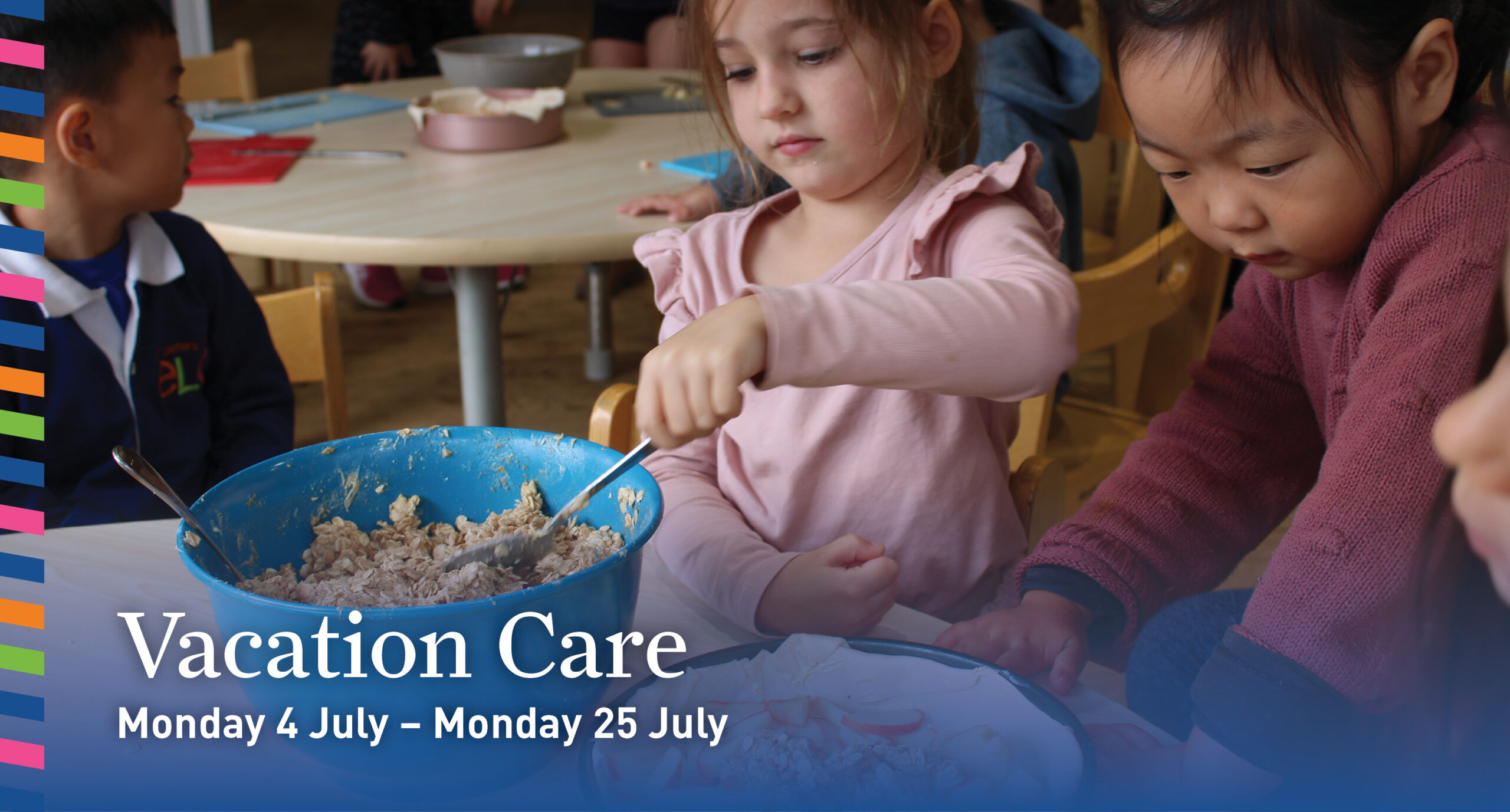
Vacation Care bookings are currently open, and will close at 5pm on Thursday 23 June. Bookings can be made via www.trybooking.com/CACAS
The Vacation Care period will run from Monday 4 July to Monday 25 July, with Tuesday 26 July the first day of Term 3.
Henrietta Balnaves and Danniella Capaldo
Extended Hours Care Team
Sustainability in the ELC

Educating for sustainability begins by supporting children’s understanding of the way the world works, such as the way things grow. Our ELC ‘Garden-to-Plate’ program is a great example of this. Connecting children as young as 2 years old to the concept of growing vegetables takes us one step further towards our goal of creating healthy lifelong relationships between children and the foods they eat.
The children in Learning Community 1 have been welcoming change and transformation by growing seedlings and documenting the changes.
‘They are growing.’ – Lydia
‘They’re not carrots yet…’ – Kayla
‘They have popped out!’ – Alina
‘Look, look, they grow big, big, big.’ – Khloe
‘It’s green!’ – Qing

In order for children to comprehend the whole picture from garden to plate, it is important we slow down so that each step can be understood and appreciated.
Educators are then continuing to offer children the opportunity to explore and cook the vegetables that are growing, connecting the two sections of our ‘Garden-to-Plate’ cooking program.
Learning Community 1
You’re Invited to Our Starry Night Gala Ball

We are counting down to our Starry Night Gala Ball on Saturday 18 June to celebrate and support our fundraising efforts for a new Gym.
Don’t miss out on this amazing evening with our Saints Girls’ community.
7pm, Saturday 18 June
Adelaide Convention Centre
Tickets: $200 per person
Includes three-course meal, beverages and live entertainment
Can You Lend a Helping Hand in the ELC?

If you have an afternoon or morning spare, we would love more volunteers to join us as we explore Ferguson Conservation Park. We try to get out to Ferguson Park as much as possible to provide the children with rich learning experiences; however, this is deemed an excursion and requires higher ratios of adults to children.
Volunteering at the ELC is a fantastic opportunity to connect with the ELC community, and our treasured walks in Ferguson Park allow the children to deepen their relationship with their natural environment.
To be an ELC volunteer, we require a copy of a Working with Children Check (which can be processed free of charge through the School) and proof of COVID-19 vaccinations. If you would like to get involved, or have any other queries, please email me via hbalnaves@stpetersgirls.sa.edu.au.
We look forward to seeing you at the ELC!
Henrietta Balnaves
ELC Manager
来自黄老师的信息

亲爱的家长们,
作为Reggio Emilia百种语言教学理念的一部分,黏土也是我们非常注重的一种特殊的语言。沾土的使用为孩子们提供了重要的学习机会,因为黏土这种材料可以塑造各种不同的形状,象征着变形与变化。
在孩子们与黏土互动时,她们的动作对黏土形状的变化起着决定性的影响。想要用这种天然的、可持续的材料将脑子中的想法变成一个具体的形状,孩子们必须保持足够的耐心和认真劲儿。
在Harding女士的支持下,学习共同体1的孩子们正在对黏土的不同阶段进行研究。黏土具有一种天然的特性,它能够从软变硬,从脆弱变得牢固。孩子们也在对水和工具如何影响黏土的变化进行各种探索与实验。
- 如果我们使用太多水,会发生什么?
- 什么东西是用黏土做成的?
- 黏土来自哪里?
类似这样的问题很多很多,我们也在和孩子们一起进行调查研究。黏土是一种具有丰富表达力的语言,需要我们去进一步了解和掌握。
使用黏土能够很好地开发和锻炼精细动作技能。在孩子们使用黏土进行创作时,她们锻炼了手指和手部的小肌肉。在揉搓、拼接、切割和使用黏土工具的过程中,孩子们能够学习并掌握各种艺术手法,并对这些艺术手法的潜力更加熟稔于心。
在学习共同体2,孩子们正在用黏土制作树叶,并重点关注树叶的形状、纹理和大小。通过使用黏土,孩子们需要考虑很多复杂的概念,比如物体的三维呈现、尺寸比例的协调等等,这是一种非常重要的学习和锻炼机会。在孩子们创作不同的形状时,我们使用描述性的语言对孩子们的创作进行评价,包括纹理和其它细节部分。孩子们在揉捏和挤压黏土或者给黏土的外形添加一些细节的过程中,眼睛和手的协调与配合能力也能得到很好的锻炼。
作为教育者,我们被孩子们与黏土的各种创造性的互动深深吸引。我们想知道:
- 孩子们是在二维视角呈现她们的想法吗?
- 在对黏土进行修补的过程中,她们是在创作吗?
- 她们是在三维视角呈现她们的想法吗?
- 黏土这种语言的背后是怎样的学习过程,我们该如何对这一学习过程进行纪录?
孩子们的创作非常漂亮,也非常精致。我们期待与你们一起分享她们的学习成果与收获。
Emma Huang works in Learning Community 2 on Tuesdays, Thursdays and Fridays from 9am – 5pm.
News from Learning Community 1

This term, our unit of inquiry is focused on the key concept of change led by our Central Idea: Welcoming transformation can support the development of knowledge.
The children’s interests and discussions around change have taken a strong focus on transformation in the natural world. They have been noticing changing weather patterns, seasonal transformation and the growth of plants, both in our ELC Community Garden and in Ferguson Park.
The children have been provided with opportunities to explore and research in the natural environment, using their senses to interact and engage with nature. Within the classroom, they have been invited to represent, document and share their observations and understandings using a range of creative languages.
Our explorations in Ferguson Park have allowed us to use the language of photography to document the changing landscape and reflect on the transformations that are occurring after we return to the ELC. Through our Literacy program, we have shared a range of texts to support children’s developing understandings of seasonal changes and weather patterns. The children have used loose parts, drawing and watercolour paints to represent autumn and share their knowledge and understandings.
We continue to explore lifecycles of fruits and vegetables through planting and caring for the seedlings in our ELC Community Garden. Small groups of children visit the ELC Community Garden on a regular basis where they are tending to our plants, documenting growth through measurement, photography and drawing, and harvesting produce when it is ready. The produce is then being used to cook and create within the classroom, further enhancing children’s knowledge of sustainable and healthy eating.
Jessica Guimaraes and Jess Catt
Learning Community 1
News from Learning Community 2

This term, our Central Idea is: Welcoming transformation can support wellbeing. But how does this translate into our everyday learning opportunities and practice in Learning Community 2?
The educators have been developing and implementing a range of practical experiences in three key areas for the children to explore and understand the concept of transformation and change:
- Transformation in the natural world – exploring and documenting the weather, the ELC Community Garden and Ferguson Park
- Transformation in ourselves – exploring and tracking how our feelings and emotions can change and shift and how we physically grow and change over time
- Transformation in our skills and abilities – exploring the concepts of persistence, resilience, having a go and trying again through sports-based activities, puzzles and games
This week, we have been inspired by the change in the weather. As a cold snap hit most of the country, we took this opportunity to engage the children in a range of experiences exploring the rain. Some children need physical full body engagement, so we went out in our rain suits and connected with the weather through our senses. Some children engaged with a range of creative languages to draw, paint, and make the rain and rain drops with recycled materials. These creative experiences were linked with mathematics and had a strong focus on sequencing and patterns. Some children worked with their educators to create books, writing and drawing what they can do on rainy days and how the rain makes them feel.
This diversity of our curriculum occurs on a daily basis as all our children’s needs and learning styles are different. We also aim to embed a range of academic curriculum areas in all the experiences we offer the children. As educators, we believe this enriches the learning for the children and also allows for deeper engagement and connection to their lived experiences.
We have been working hard to capture and document your children’s involvement in these experiences and are excited to share these with you through your child’s portfolio which will be available for you at the end of this term.
Nell Tierney, Kathy McCabe and Laura Reiters
Learning Community 2
Find Out What Happens Throughout the Day at ELC

The ELC Learning Community Home Page is a dynamic online sharing space that invites you to participate in the communities’ learning as it happens. We use this tool to communicate important information with families and provide a window into the children’s life at the ELC, as educators share documentation of teaching, specialist lessons and spontaneous moments.
Accessing myLink for the first time:
Each parent has an individual username to access our myLink parent portal.
Your username is {ID+}@stpetersgirls.sa.edu.au
Please note that the username is your ID number followed by @stpetersgirls.sa.edu.au
Your ID number has been provided to you in an email from the School
If you have not accessed myLink before or have forgotten your password, please follow these steps:
- Visit https://mylink.stpetersgirls.sa.edu.au
- Sign in with your parent username
- Click on ‘Forgot my password’
- Make sure the ‘email’ address is your parent username, type in the code, then click the blue ‘Next’ button
- Enter your mobile number registered with the School, with the area code (Australia is +61), dropping the 0 at the beginning (e.g. +61 400000000). Then select ‘Text’
- Enter the security code sent to your mobile number
- Enter the password you would like to use and click ‘Finish’
- Return to the login screen at https://mylink.stpetersgirls.sa.edu.au to access myLink
Accessing the Learning Community Home Page through myLink:
- Access myLink as per the above instructions
- Click on the ‘MYLINK HOME’ tab
- Click on your child’s name tab
- Under ‘Class Contacts’, click on the ELC room name (you may need to enter your user name and password again)
If you have any issues accessing or navigating myLink, please contact our IT Hub via helpdesk@stpetersgirls.sa.edu.au or 8334 2227.
ELC’s Online Etiquette Policy: please note that the ELC Learning Community Home Page and ELC News contain images and videos of other children. We therefore ask that you do not copy or share images or videos, especially on social media, if they contain other children.
Absences in the ELC
Student Absences Please notify the School via one of the following methods for late arrivals/early departures and absences, ensuring a reason for the absence is included.
Text: 0428 601 957 (save to phone contacts as SPGS)
Email: attendance@stpetersgirls.sa.edu.au
Phone: 8334 2200 or phone the relevant room as per the contact list below.
Please include the relevant room teacher when sending via email.
ELC Room Contacts:
Bell Yett – 8155 5777
Ferguson – 8155 5776
Hallett – 8155 5775
Stonyfell – 8155 5778
ELC Immunisation Policy
Under the Government’s No Jab No Play policy, families must meet immunisation requirements to attend the ELC and receive the Child Care Subsidy. Families are required to provide all approved immunisation records to the ELC. Further information is available by clicking here.
Children who are suffering from illnesses such as those listed below must be excluded from ELC in line with our Exclusion Policy:
- Influenza
- Chicken Pox
- Conjunctivitis
- Diarrhoea
- Hand, Foot and Mouth Disease
- High Temperature
- Infectious Hepatitis
- Measles
- Meningitis
- Mumps
- Rubella (German Measles)
- Scabies
- Scarlet Fever
- School Sores (Impetigo)
- Upper Respiratory Tract Infection
- Vomiting
- Whooping Cough
